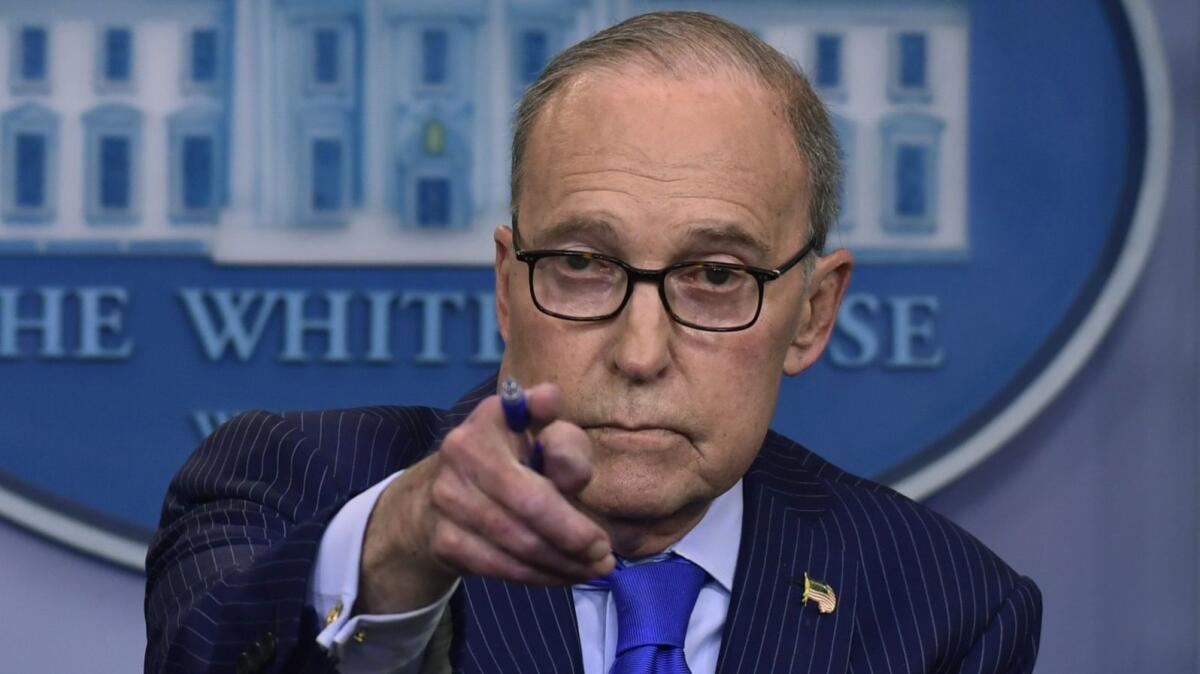Analysis: Trump’s top economic advisor says deficit is ‘coming down rapidly,’ contradicting virtually all available data

- Share via
President Trump’s top economic advisor said Friday that the federal deficit is “coming down rapidly,” contradicting estimates by nonpartisan analysts, Congress’ official scorekeeper and a branch of the White House.
Larry Kudlow, director of the White House’s National Economic Council, said on Fox Business that stronger economic growth was creating enough new tax revenue to bring down the deficit.
“The deficit — which was one of the other criticisms [of the GOP tax law] — is coming down, and it’s coming down rapidly,” Kudlow said. “It’s throwing up enormous amounts of new tax revenue.”
In the same interview, Kudlow broke tradition by urging the Federal Reserve to raise interest rates “very slowly.”
It’s hard to know where Kudlow is getting his deficit numbers. The deficit from January through April was $161 billion, according to the Treasury Department, up from $135 billion at the same point last year. And it will deteriorate further from here, since the Treasury collects a large amount of tax revenue during April, when taxes are due for most Americans.
Kudlow, whose office did not immediately respond to a request for comment, may have been referring to a Congressional Budget Office report this week that said the long-term deficit would be smaller than its estimate in 2017, partly because of revised downward estimates of healthcare spending.
But that CBO report made clear that deficits are still set to rise — in both the near term and the long term. “The federal budget deficit, relative to the size of the economy, would grow substantially over the next several years, stabilize for a few years, and then grow again over the rest of the 30-year period,” the CBO said, projecting that deficits as a percentage of the economy would rise from 3.9% in 2018 to 9.5% in 2048. The agency projects that on average of the next decade, the deficit would represent 4.9% of economic activity.
Commenting specifically on the 2017 tax law, the CBO said the law would increase deficits by $1.27 trillion over the next decade, even when including the law’s positive effects on the economy. Annual deficits require the government to borrow money to finance its operations, adding debt. The CBO estimates that the amount of debt the United States will have in a decade will equal almost the total size of the economy.
Official White House data suggest that deficits are increasing too. The White House’s Office of Management and Budget says the deficit is rising from $665 billion in 2017 to $832 billion in 2018 and will approach $1 trillion annually in 2019.
“Deficits are not going down. They are going up,” said Marc Goldwein, senior vice president of the Committee for a Responsible Federal Budget, a nonpartisan think tank that advocates for budget discipline.
Kudlow’s comments on the Fed ignored the practice from preceding administrations of avoiding comments on monetary policy out of respect for the U.S. central bank’s independence.
“My hope is that the Fed, under its new management, understands that more people working and faster economic growth do not cause inflation,” Kudlow said, shortly before fresh data showed inflation pushing a bit above the Fed’s 2% target.
Trump has reshaped the Fed’s leadership since taking office, picking Jerome Powell as chairman and Randal Quarles as its top banking regulator. Trump’s nomination of Richard Clarida for vice chairman has still to be confirmed by the Senate.
“I speak to Jay Powell periodically and he’s a good man,” Kudlow said. “My hope is they understand that and they will move very slowly.”
A Fed spokesman declined to comment.
Most developed-world central banks are given a degree of independence from governments so monetary policy doesn’t succumb to the whims of politicians. In emerging markets such as Turkey, the government has felt no such restraint.
Powell, speaking in Portugal on June 20, said the case for continued gradual interest-rate increases remains strong. The Fed raised rates on June 13 for the second time in 2018 and signaled two more moves this year. It is continuing to slowly tighten monetary policy to keep inflation in check amid unemployment that has declined to the lowest level since 2000.
Previous White Houses in recent decades have tried to avoid public comment on the Fed, but Kudlow hasn’t held back. In March, after Trump picked him to replace Gary Cohn, he said he hoped the Fed didn’t “overdo it” on policy as he argued that officials should just let the economy “rip.”
The Fed is answerable to Congress but has been granted independence to pursue dual goals for maximum employment and low inflation mandated by lawmakers.
Bloomberg News contributed to this report.
UPDATES:
12:15 p.m.: This article has been updated with a Bloomberg report on Kudlow urging the Federal Reserve to raise interest rates slowly.
This article was originally published at 9:45 a.m.
More to Read
Inside the business of entertainment
The Wide Shot brings you news, analysis and insights on everything from streaming wars to production — and what it all means for the future.
You may occasionally receive promotional content from the Los Angeles Times.










